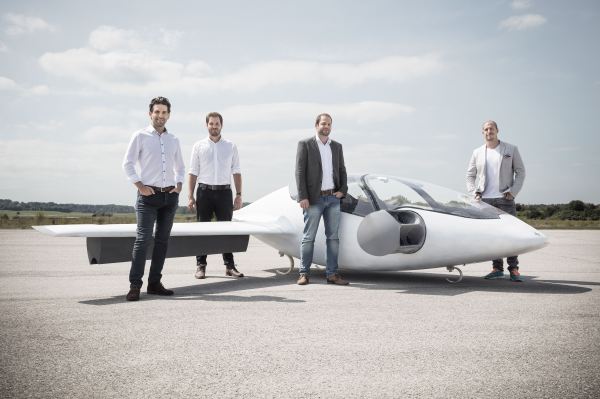Imagine some time in the not-so-distant future. After making your way to the nearest community landing strip, you’ll pull out your phone, and, with a single tap, hail the closest air taxi to take you to your chosen destination. The experience will have Uber-like convenience but the mode of transport couldn’t be any more different.
Never again will you need to ask your taxi driver to take the scenic route as you’re flown from one location to another, much faster than by car and with significantly less environmental impact. That’s the promise of the five-seater Lilium jet, a new kind of all-electric vertical take-off and landing (VTOL) device being developed by a startup based in Munich, Germany, which, until just a few years ago, had yet to come into existence.
“The founding mission of the company was to enable everyone to use this kind of transportation system in their everyday lives,” Lilium co-founder and CEO Daniel Wiegand tells TechCrunch. “We want to be the leading company enabling every person to take a jet instead of using the car and be five times faster to their destination… There’s going to be an app and from day one you’ll be able to book this airplane as a service”.
Despite what you may have read elsewhere, however, day one is still “several years” off, with Wiegand describing the Lilium jet as following a classic development timeline for any new aircraft of its size. That’s not to say that the startup hasn’t made significant headway to date, including a first public and successful flight in April for a two-seater and remote operated version of the jet, which, says the Lilium CEO, didn’t go unnoticed by investors.
We have been extremely successful, specifically inventing a new aircraft concept that hasn’t been done before Lilium co-founder and CEO Daniel Wiegand
Today the company is announcing it has closed $90 million in Series B funding, up from the $10 million Series A Lilium raised a year ago. Backing the round are Tencent; LGT, the international private banking and asset management group; Atomico, Lilium’s Series A backer founded by Skype co-founder Niklas Zennström; and Obvious Ventures, the early-stage VC fund co-founded by Twitter’s Ev Williams.
“When we had the Series A investment, we had an idea and a smart founding team and a promise, basically. In April we delivered that: we have shown a full-scale airplane flying, even in transition from hover flight, so we could really demonstrate this is the best technology in that field and it works. That was probably the key difference”.
In addition to a successful test flight, Wiegand says Lilium has “built up a lot on the company side,” in terms of hiring and processes and growing the engineering team. Headcount now stands at more than 75 people, around half of which are non-German. And just last month, Lilium added a number of key hires from notable companies in the transportation space, including Dr. Remo Gerber, former MD for Western Europe at Gett, who joined as chief commercial officer. “It’s a totally different company than it was one year before,” Wiegand says.
Neither a conventional airplane nor helicopter — but, to some extent, capable of doing the job of both — there are a number of other startups that are focused on the electric aircraft market, including Kitty Hawk and Zee.aero, both backed by Larry Page; and Vahana, backed by Airbus.
If you look closely at the aircraft you’ll see there is no tail, because the tail adds drag and adds weight to an aircraft Lilium co-founder and CEO Daniel Wiegand
The Lilium jet’s party trick is that multiple engine flaps tilt from a vertical into a horizontal position depending on the jet’s flight mode. During take-off, the flaps are tilted vertical to enable the engines to lift the aircraft, but, once airborne, the flaps transition slowly into a horizontal position to enable the aircraft to accelerate until enough lift is provided by the wings alone, just like a conventional airplane.
However, it is the insistence that the Lilium VTOL jet should be solely electric-powered that really stands out and has left some aviation experts sceptical that the startup can reach its goal of speeds up to 300 kph and a distance of 300 km. Wiegand sounds unfazed.
“The biggest challenge is with batteries… Compared to gasoline, there is roughly one hundred times less energy per kilogram of batteries than there is per kilogram of gasoline, and that means you have to have an aircraft concept that is extremely efficient in the way it deals with the energy and is extremely efficient in moving forward in the air. There we have been extremely successful, specifically inventing a new aircraft concept that hasn’t been done before,” he says.
Asked to elaborate a little, Wiegand says there are many differences in the details, such as using electric jet engines not open propellers. “Electric jet engines give a better compromise between safety, efficiency, noise and performance,” he explains. “There are also other things like the aircraft concept itself. If you look closely at the aircraft you’ll see there is no tail, because the tail adds drag and adds weight to an aircraft. We’ve done optimizations in almost every field, from aerodynamics, to lightweight design, to the propulsion concept”.

Of course, beyond the specific technical challenges posed by an all-electric VTOL, an air taxi service on the scale that Lilium envisions will require considerable buy-in from legislators and the wider public. Won’t things like noise pollution and skyline pollution be an issue if we are to see an entirely new flight-based transportation system become a reality? Not so, reckons the Lilium founder.
“Of course we thought of potential downsides from day one, that’s why we have invested a tremendous amount of energy and money to reduce the noise of these electric engines to the lowest possible degree. We’ve been hugely successful in that,” he explains. “The aircraft is around four times less noisy than a helicopter and you can only hear it when it is taking off and landing. Once the aircraft is in flight at a one kilometre altitude, for example, you can’t hear it from the ground. And that’s a huge benefit”.
You can’t hear it when it’s flying, you don’t need to build any infrastructure that cuts through nature, and it doesn’t create any emissions Lilium co-founder and CEO Daniel Wiegand
In terms of visibility, Wiegand says that, for the most part, you probably won’t notice the presence of Lilium jets because they will fly at quite high altitude. “It’s a small tiny dot but you can’t completely vanish it,” he says. Unlike cars, you won’t ever see hundreds of Lilium jets in one spot, either. And at five times faster, less are needed “to do the same transportation job as cars”.
“You can’t hear it when it’s flying, you don’t need to build any infrastructure that cuts through nature, and it doesn’t create any emissions [fine dust or CO2],” says Wiegand, claiming that the Lilium jet can potentially become the means of transportation that creates the smallest impact on the environment possible.
But perhaps the greatest upside is the impact an air taxi service like Lilium could have on productivity and therefore the economy. “It’s not only a benefit in terms of relieving society from transit traffic, but the much, much bigger benefit would be that everyone can use it and that people can get to their destination five times quicker, basically a five times increase of their daily radius of life. This connectivity is going to be a huge benefit to society but also economic growth,” he says.
All of which makes it even more curious that Lilium’s founding story paints Wiegand as an almost accidental entrepreneur, first conceiving of Lilium all the way back in November 2013, two years before recruiting his co-founders Sebastian Born, Matthias Meiner and Patrick Nathen.
Recalls the Lilium CEO: “I was alone when I had the idea that this would be the perfect means of transportation. It was more a fun project for me to make some calculations and concept estimations and to see whether it’s physically possible. And a friend of mine said, ‘hey, you can do this, you have to do this, it’s just too amazing’. We had drunk maybe a little bit too much beer, but actually the idea that he had sparked to found a company that builds a new kind of transportation system, it didn’t go away, so I decided to go back to Germany and assemble a founding team and set up a company that builds these aircrafts”.
On the topic of Lilium’s Munich-based HQ, Wiegand says the jet’s ‘made in Germany’ engineering has been “a very good friend that is well-known,” not least in the eyes of investors. “I think people knew that for hardware there is no better place to do it,” he says, noting that Southern Germany is home to world-class and hugely successful engineering companies such as BMW, Siemens, Audi, and Porsche. If all goes to plan, perhaps one day Lilium can be added to that list.
